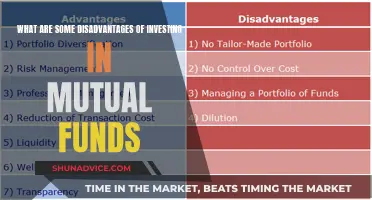
Money market funds are a type of mutual fund that invests in short-term, low-risk debt securities. They are intended as a short-term, liquid investment, providing little capital appreciation but generating modest income through interest. Money market funds are considered extremely low-risk and aim to maintain a net asset value (NAV) of $1 per share. They are a good option for investors who want to benefit from the current high-interest-rate environment or are saving for short-term goals. However, money market funds are not suitable for long-term investment goals like retirement planning as they offer little capital appreciation and are not insured by the Federal Deposit Insurance Corporation (FDIC).
| Characteristics | Values |
|---|---|
| Type of fund | Mutual fund |
| Investment type | Short-term, highly liquid, low-risk debt instruments |
| Risk level | Low |
| Returns | Low |
| Income | Modest |
| Capital appreciation | Little |
| NAV | $1 per share |
| Sensitivity | Interest rate fluctuations |
| FDIC insurance | No |
| SIPC insurance | Yes |
What You'll Learn

Money market funds vs money market accounts
Money market funds and money market accounts are two different financial tools with distinct features and benefits. Here is a detailed comparison between the two to help you understand their similarities and differences and make informed decisions about your investments.
Money Market Funds vs. Money Market Accounts:
Nature and Functionality:
- Money Market Funds: Money market funds, introduced in the 1970s, are a type of mutual fund that invests in highly-rated, short-term, low-risk debt securities. They offer investors a slightly higher yield than traditional bank accounts while maintaining a low-risk profile. Money market funds are not federally insured and are considered investment products.
- Money Market Accounts: Money market accounts, also known as money market deposit accounts, are interest-bearing bank accounts that combine features of both checking and savings accounts. They are federally insured (up to $250,000) and offer liquidity along with competitive interest rates.
Interest Rates and Returns:
- Money Market Funds: These funds typically earn slightly higher interest rates compared to money market or savings accounts. The returns are derived from the underlying investments, and there is no fixed interest rate. The funds invest in low-risk securities, providing stable but relatively low returns.
- Money Market Accounts: Money market accounts offer higher interest rates than traditional savings or checking accounts. The interest rates vary among banks and credit unions, and some top-yielding accounts currently offer APYs greater than 5%.
Access and Liquidity:
- Money Market Funds: Investors do not have direct access to their funds through debit cards or check-writing privileges. Transfers from a money market fund to a bank account may take one or more business days. Money market funds offer similar liquidity to money market accounts but with added transaction delays.
- Money Market Accounts: These accounts often provide a debit card and check-writing privileges, giving account holders easy access to their funds. However, there are usually transaction limits, typically restricting account holders to six withdrawals per billing statement period.
Risk and Insurance:
- Money Market Funds: Money market funds are considered low-risk investments but are not insured by the FDIC or NCUA. In rare cases, investors could lose money if the fund's share price falls below $1. While money market funds aim to maintain a $1 share price, extreme market conditions can lead to losses.
- Money Market Accounts: Money market accounts are insured by the FDIC (Federal Deposit Insurance Corporation) or NCUA (National Credit Union Administration) for up to $250,000 per depositor. This insurance provides a safety net and guarantees that account holders will not lose their money if the financial institution fails.
Fees and Charges:
- Money Market Funds: Money market funds have management fees, known as expense ratios, which are deducted from the earnings. These fees impact the overall returns and should be considered when choosing a fund.
- Money Market Accounts: Money market accounts may have various fees, such as service fees, overdraft fees, or ATM fees. Some accounts charge a fee if the account balance falls below a minimum monthly balance requirement. It is important to review the fee structure before opening an account.
Suitability:
- Money Market Funds: Money market funds are suitable for those seeking a slightly higher interest rate than money market accounts and are willing to accept a degree of risk. They are ideal for long-term savings goals and investors who don't need immediate access to their funds.
- Money Market Accounts: Money market accounts are attractive for emergency funds, short-term savings goals, and those who prefer the security of federal insurance. They offer liquidity and competitive interest rates, making them a good option for those who want easy access to their savings.
In conclusion, both money market funds and money market accounts offer distinct advantages and considerations. Money market funds provide slightly higher interest rates and are suitable for investors comfortable with a degree of risk and seeking long-term savings options. On the other hand, money market accounts offer federal insurance, competitive interest rates, and easy access to funds, making them ideal for emergency funds and short-term financial goals.
A Guide to Investing in VC Funds in India
You may want to see also

Types of money market funds
Money market funds are classified into various types depending on the class of invested assets, the maturity period, and other attributes. Here are some of the most common types:
- Prime Money Funds: These funds invest in floating-rate debt and commercial paper of non-Treasury assets, which may be issued by corporations, U.S. government agencies, and government-sponsored enterprises (GSEs). Prime money funds are considered retail money funds and are only available to individual investors.
- Government Money Funds: These funds invest primarily in cash, government securities, and repurchase agreements that are fully collateralized by cash or government securities. Treasury Funds are a subset of Government Money Funds, focusing on standard U.S. Treasury-issued debt securities such as Treasury bills, bonds, and notes.
- Tax-Exempt Money Funds (or Municipal Money Funds): These funds offer earnings that are exempt from U.S. federal income tax and, in some cases, state income taxes as well. They primarily invest in municipal bonds and other debt securities issued by states, local governments, and municipal agencies.
- Retail Money Funds: These funds are accessible to individual investors due to their small minimum investment requirements.
- Institutional Money Funds: These funds are designed for institutional investors, typically requiring a high minimum investment amount (often $1 million or more).
Reliance Large Cap Fund: Worth the Investment?
You may want to see also

Advantages and disadvantages of money market funds
Money market funds are a type of mutual fund that invests in highly-rated, short-term debt securities. They generate income but little to no capital appreciation. Money market funds were established in the 1970s to provide a slightly higher-yielding alternative to interest-bearing bank accounts.
Advantages
- Low Risk and Short Duration: Money market funds are often considered less risky than stocks and bonds. They invest in low-risk vehicles such as certificates of deposit (CDs), Treasury bills (T-Bills), and short-term commercial paper. The short durations of these securities also limit the fund's sensitivity to interest rate risk.
- Stability and Security: Money market funds are one of the least volatile types of investments available. They can help offset the greater volatility of stock and bond investments in a portfolio. Money market funds are also highly liquid, allowing investors to buy and sell them with relative ease.
- Potential Tax Efficiency: Interest payments from some fund investments may be exempt from federal and state income taxes.
Disadvantages
- Low Returns: Money market funds typically carry low single-digit returns. These low returns may result in a loss of purchasing power if they fail to keep up with the rate of inflation.
- Expenses: Small annual fees can eat up a substantial chunk of profits, especially when returns are already low. This makes it more difficult for investors to keep up with inflation.
- No Federal Insurance Protection: Money market funds are not insured by the Federal Deposit Insurance Corporation (FDIC). While the Securities Investor Protection Corporation (SIPC) provides some financial protection, investors could still lose some or all of their money if the fund collapses.
- Risk of Higher Yields: Fund managers may take on additional risks to obtain higher yields. This could include investing in bonds or commercial paper with higher risks.
- Lost Opportunity: By investing in money market funds, individuals may miss out on opportunities for better rates of return from other types of investments, such as common stocks, which have historically returned about 8% to 10% on average.
In conclusion, while money market funds offer stability and security, they may not be ideal for long-term investing due to their low returns and lack of capital appreciation. They are more suitable for individuals looking for a stable, short-term investment option.
SBI Dynamic Bond Fund: Worth Investing?
You may want to see also

History of money market funds
Money market funds were designed and launched in the early 1970s in the United States. They were created as an option for investors to purchase a pool of securities that generally provided better returns than those available from a standard interest-bearing bank account. The first money market fund, called the Reserve Fund, was created in 1971. At the time, banks were capped at the amount of yield they could pay out in a savings account at 5.25% per year. Through the use of short-term treasury bills and commercial paper, money market funds were able to offer much higher yields, in the 8-9% range, which were more reflective of prevailing rates at the time.
Every other fund company immediately copied this idea. Assets in money markets ballooned from $4 billion in 1977 to $185 billion in 1981. It probably helped that interest rates were much higher back then. Vanguard started its first money market fund in 1975.
Money market funds gained rapid popularity because they were an easy way for investors to purchase a pool of securities that, in general, offered better returns than those available from a standard interest-bearing bank account. Commercial paper has become a common component of many money market funds. Historically, money market funds held only government bonds. However, this transition away from only government bonds resulted in higher yields, though it came with risks as well: the reliance on commercial debt led to the Reserve Primary Fund crisis.
In 2010, following the 2008 financial crisis, the SEC issued new rules to better manage money market funds. These rules were intended to provide more stability and resilience by placing tighter restrictions on portfolio holdings and introducing provisions for imposing liquidity fees and suspending redemptions.
Mutual Fund Investing: A Comprehensive Guide for Beginners
You may want to see also

Regulation and structure of money market funds
Money market funds are a type of mutual fund that invests in highly liquid, low-risk, short-term debt instruments and cash equivalents. They are considered extremely low-risk on the investment spectrum and are intended as a short-term, liquid investment option.
In the US, money market funds fall under the purview of the Securities and Exchange Commission (SEC), which defines the necessary guidelines for the characteristics, maturity, and variety of allowable investments in such a fund. The SEC also introduced new rules in 2010 and made fundamental structural changes in 2016 to enhance market stability and investor protection.
Regulation
- Money market funds are regulated by the SEC under the Investment Company Act of 1940.
- Rule 2a-7 of the act restricts the quality, maturity, and diversity of investments by money market funds.
- A money market fund mainly invests in top-rated debt instruments with a maturity period of under 13 months.
- The fund portfolio must maintain a weighted average maturity (WAM) of 60 days or less, ensuring that only highly liquid instruments are used.
- A money market fund is not allowed to invest more than 5% in any one issuer, except for government-issued securities and repurchase agreements.
- The SEC issued new rules in 2010 to increase the resilience of money market funds and introduced stress tests and other measures to enhance their reputation and stability.
- In 2014, the SEC further amended the rules, requiring prime institutional money funds to float their net asset value (NAV) and giving non-government money market fund boards new tools to address runs, such as liquidity fees and redemption gates.
Structure
- Money market funds invest in highly liquid, near-term instruments, including cash equivalent securities and high-credit-rating, debt-based securities with short-term maturity.
- They aim to maintain a stable NAV of $1 per share and pay regular dividends to investors.
- Money market funds are managed by fund operators, who invest in various debt-based financial instruments, such as bankers' acceptances, certificates of deposit, commercial paper, repurchase agreements, and US Treasuries.
- They are considered safe and liquid investments, suitable for parking substantial amounts of cash in the short term, but not for long-term investment goals like retirement planning due to their low capital appreciation.
- Money market funds do not have FDIC insurance but are covered by the Securities Investor Protection Corporation (SIPC).
The S&P 500 Index Fund: Your Easy Investing Guide
You may want to see also
Frequently asked questions
A money market fund is a mutual fund that invests in short-term, low-risk debt instruments and cash equivalents. They are intended as a short-term, liquid investment, providing little capital appreciation but generating modest income through interest.
Money market funds are considered extremely low-risk investments with high liquidity. They are also a good option for investors looking to benefit from rising interest rates.
Money market funds have low returns, are sensitive to interest rate fluctuations, and do not offer much capital appreciation, making them unsuitable for long-term investment goals. They also lack FDIC insurance.
When choosing a money market fund, consider the yield, expense ratio, and type of fund (government, prime, or municipal). Compare funds to find one that suits your investment goals and risk tolerance.







